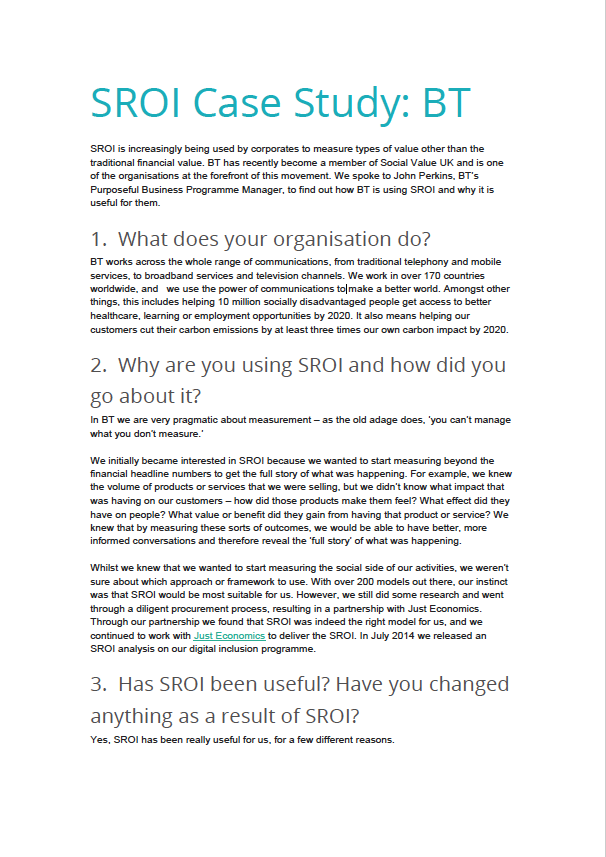
Posted 3rd August 2015
SROI is increasingly being used by corporates to measure types of value other than the traditional financial value.
BT has recently become a member of Social Value UK and is one of the organisations at the forefront of this movement.We spoke to John Perkins, BT’s Purposeful Business Programme Manager, to find out how BT is using SROI and why it is useful for them. Below are a few excerpts from the case study.
Why are you using SROI and how did you go about it?
In BT we are very pragmatic about measurement – as the old adage does, ‘you can’t manage what you don’t measure.’
We initially became interested in SROI because we wanted to start measuring beyond the financial headline numbers to get the full story of what was happening. For example, we knew the volume of products or services that we were selling, but we didn’t know what impact that was having on our customers – how did those products make them feel? What effect did they have on people? What value or benefit did they gain from having that product or service? We knew that by measuring these sorts of outcomes, we would be able to have better, more informed conversations and therefore reveal the ‘full story’ of what was happening.
Whilst we knew that we wanted to start measuring the social side of our activities, we weren’t sure about which approach or framework to use. With over 200 models out there, our instinct was that SROI would be most suitable for us. However, we still did some research and went through a diligent procurement process, resulting in a partnership with Just Economics. Through our partnership we found that SROI was indeed the right model for us, and we continued to work with Just Economics to deliver the SROI. In July 2014 we released an SROI analysis on our digital inclusion programme.
Has SROI been useful? Have you changed anything as a result of SROI?
Yes, SROI has been really useful for us, for a few different reasons.
Informing the product development cycle: The SROI study of our digital skills programme gave us deep insight in to the barriers our customers needed to overcome to benefit from the online world. It has helped shape the development of two new propositions in the UK: BT Basic Broadband, for those on low income, and Digital Inclusion for Social Housing, a shared broadband product for housing associations. These two products are tackling digital exclusion at scale whilst generating new revenue for the business.
Better conversations with stakeholders: Because we’re using such a unique measurement framework, we were approached by a few different organisations who wanted to know more about our work in this area, including Ofcom and the Office for National Statistics. We’ve also started working with the Cabinet Office’s Government Digital Service to lead and help them to develop a social impact framework to measure digital inclusion. These conversations happened as a result of us using SROI because it helped to show that we were ahead of the crowd and interested in measuring and valuing outcomes in a different, new way. Over the last 18 months we have seen a marked increase in interest in what we’re doing around social value measurement and accounting from other organisations and investors. If this trend continues, I’m hoping that that it will eventually lead to SROI sitting alongside traditional accounting as a way in which all organisations manage their social value.
Internal conversations: In terms of how SROI has changed what we have done, the main thing is that it has changed the way we look at things. By looking beyond the business value, it enables us to look at our business and projects in a completely different light, and to ask different questions about what we do. Knowing that our ambition was to have SROI sitting alongside traditional financial reporting, we were keen to engage our Finance colleagues from the start. As evidence of this we invited our External Reporting Director to sit on the steering group. This allowed us to take two important steps (a) we were able to have a view from someone at the heart of our Finance team on their expectations and how to integrate SROI into a wider reporting framework and (b) it helped conversations with other senior BT Finance stakeholders who otherwise might not have engaged with, and understood the importance of, SROI.
